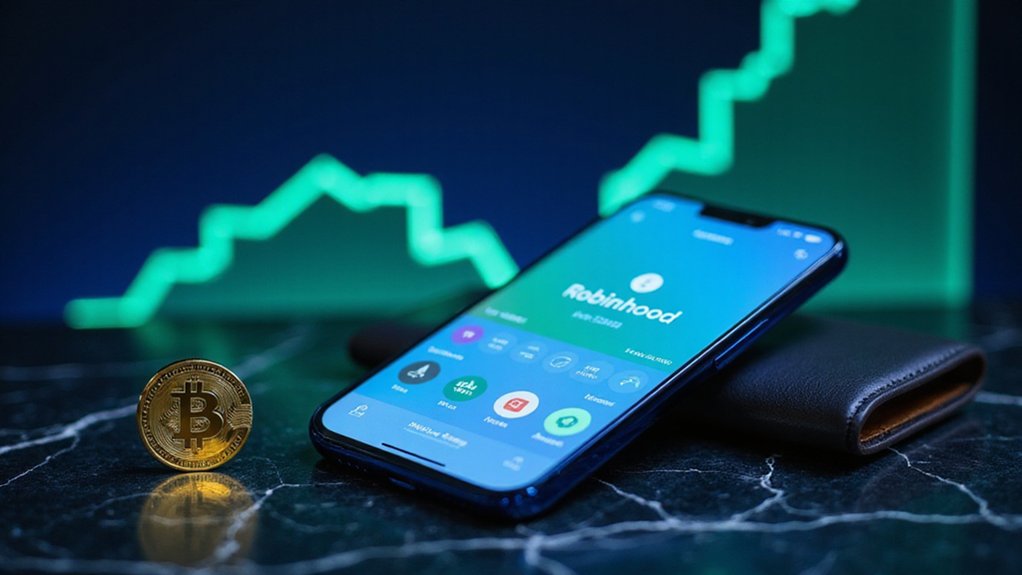Robinhood currently offers 19 cryptocurrencies for trading, including market stalwarts Bitcoin and Ethereum alongside more speculative fare like Dogecoin and PEPE. Recent additions to their crypto roster include Solana, XRP, Cardano, AAVE, LINK, COMP, and the memecoin BONK—all tradable with Robinhood’s signature commission-free model and $1 minimum investment threshold. The platform employs tiered routing mechanisms while storing assets primarily in cold storage for security. Further exploration reveals nuanced regulatory frameworks governing these digital assets.

The digital-asset landscape at Robinhood presents a curious intersection of traditional finance accessibility and crypto-market participation—a crossroads where retail investors can now dabble in Bitcoin with the same ease as buying fractional shares of Apple.
The platform currently hosts 19 cryptocurrencies, with flagship offerings including Bitcoin (BTC), Ethereum (ETH), and the internet’s favorite meme-turned-medium-of-exchange, Dogecoin (DOGE).
Recent additions to this digital menagerie include Solana (SOL), XRP, Cardano (ADA), and—perhaps inevitably—the amphibian-themed phenomenon PEPE.
Robinhood’s crypto infrastructure incorporates tiered routing strategies that would make a network engineer nod in approval; Bitcoin, Ethereum, and Dogecoin benefit from market maker routing, while Ethereum (appearing twice in this architecture, curiously enough), Litecoin, and the canine-inspired Shiba Inu token utilize smart exchange routing.
Users maintain full ownership rights of their digital assets upon purchase—a feature that seems elementary but remains surprisingly exceptional in certain corners of the crypto ecosystem.
The platform’s security posture merits attention: nearly all customer cryptocurrencies hibernate in cold storage—offline wallets inaccessible to digital marauders—with regular audits conducted to verify compliance with increasingly complex regulatory frameworks.
One should note, however, that unlike their traditional investment counterparts, these digital assets lack the protective umbrella of FDIC or SIPC insurance.
Robinhood Crypto, operating under NMLS ID 1702840 and licensed by New York State’s Department of Financial Services, extends its services throughout all U.S. states, Puerto Rico, and the U.S. Virgin Islands, albeit subject to the patchwork of state regulations that characterize America’s current crypto governance landscape.
The platform’s commission-free trading model and $1 minimum investment threshold have demonstrably lowered barriers to entry for crypto-curious investors.
Unlike its approach to stocks and ETFs, Robinhood’s cryptocurrency trading leverages the payment for order flow model to generate revenue while maintaining commission-free trades for users.
For those tracking the platform’s evolutionary trajectory, recent additions like Aave (AAVE), Chainlink (LINK), Compound (COMP), and the whimsically named BONK token signal Robinhood’s response to persistent customer demand for asset diversity.
This strategic positioning that has generated palpable optimism within digital asset communities.
Frequently Asked Questions
What Are the Fees for Trading Cryptocurrencies on Robinhood?
Robinhood imposes a trading fee of approximately 0.55% for cryptocurrency transactions—a rate that, while not insignificant, positions itself competitively within the market landscape.
Users enjoy the absence of debit card deposit fees and account maintenance charges, creating a relatively streamlined fee structure.
Unlike some exchanges that employ the dubious practice of markup spreads (effectively a hidden fee), Robinhood refrains from such tactics, offering a more transparent cost structure for crypto enthusiasts exploring the digital asset space.
Can I Transfer My Crypto From Robinhood to a Private Wallet?
No, Robinhood doesn’t permit direct cryptocurrency transfers to external wallets—a limitation that’s rather notable in the evolving crypto landscape.
Users who purchase digital assets on the platform are effectively constrained to Robinhood’s ecosystem, where the majority of cryptocurrencies remain secured in cold storage.
While users legally own their purchased assets, this ownership exists within the boundaries of Robinhood’s infrastructure, sans the portability that crypto purists might consider fundamental to the asset class’s ethos.
Does Robinhood Offer Crypto Staking Options?
Robinhood offers limited crypto staking options, currently supporting only Ethereum (ETH) and Solana (SOL).
This rather modest selection pales in comparison to competitors like Coinbase, which boasts a more extensive staking portfolio.
Users can participate in network validation while earning rewards, though they should note the inherent risks—assets become temporarily locked, rewards fluctuate with network conditions, and value depreciation remains possible while funds are staked.
Are There Limits to Cryptocurrency Trading on Robinhood?
Robinhood’s crypto trading comes with several guardrails worth noting.
A $1 minimum purchase requirement enables micro-investing, while market orders face execution collars (1% above for buys, 5% below for sells) to prevent slippage.
Unexecuted market orders self-destruct after two minutes—a curious safeguard against market volatility.
While PDT rules apply to securities trading, they mercifully spare crypto enthusiasts.
Geographic availability is extensive across U.S. territories, though the standard “not FDIC insured” disclaimers naturally apply.
How Does Robinhood’s Crypto Security Compare to Dedicated Exchanges?
Robinhood’s crypto security represents a classic tradeoff—simplicity for sovereignty.
While employing industry-standard cold storage practices, Robinhood’s custodial model (where users lack private keys) fundamentally diverges from dedicated exchanges that enable self-custody.
SIPC insurance provides modest protection against brokerage failure, but—unlike some specialized exchanges—offers no safeguards against hacking.
Security-conscious investors might find the platform’s streamlined approach convenient but ultimately limiting compared to exchanges with more robust security features and true asset ownership.









